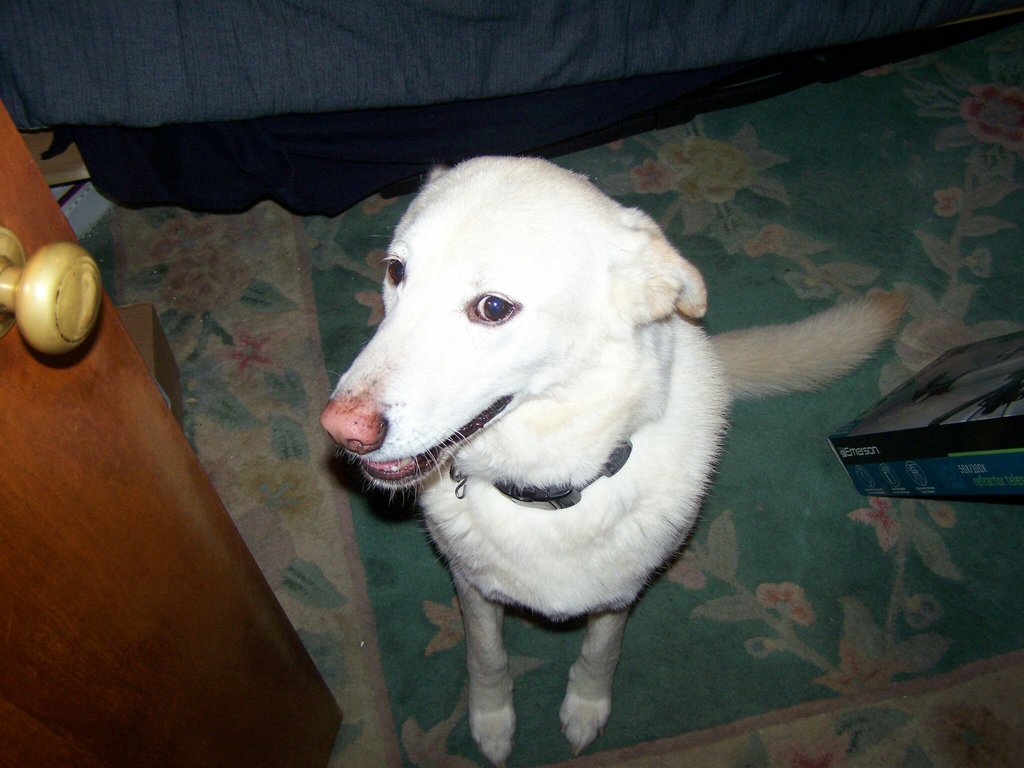It looks like you're using an Ad Blocker.
Please white-list or disable AboveTopSecret.com in your ad-blocking tool.
Thank you.
Some features of ATS will be disabled while you continue to use an ad-blocker.
share:
Advancements in technology have allowed researchers to safely analyze brain activity in dogs. The researchers were able to determine that dogs can recognize not only words, but the emotional tone behind them. Dogs recognize when both words and tone indicate praise. That's when they feel rewarded.
Seeker: Dogs gert what we say and how we say it
For the study, Andics, a researcher in the Department of Ethology and MTA-ELTE Comparative Ethology Research Group at Eötvös Loránd University, and his colleagues trained 13 dogs to lie down completely motionless in an fMRI brain scanner as their trainers talked to them. Prior studies on speech processing required more invasive methods conducted on animals such as rodents, but, in this case, the dogs were not restrained. If they indicated discomfort in any way, such as by wiggling a bit, the sessions were immediately stopped.
Meaningful, but not meaningless, words were processed in the dogs' left hemisphere, the brain activation images showed. The dogs' right hemisphere, conversely, activated when they were distinguishing different types of intonation, such as happy praising tones versus more neutral ones. As all of this audible information is taken in, a dog is then capable of understanding a familiar phrase, such as "Good boy!"
Past studies have indicated that dogs can recognize words; it's estimated that they can track up to 1,000 different words associated with items, and they can retrieve the appropriate item on command. But that's a relatively simple form of association. The work here suggests that dogs can actually perceive the meaning of certain bits of human speech.
I've always have dogs, malamute's, and have always enjoyed how those dogs speak. We're
a reply to: TheAmazingYeti
My current dog is almost 3 years old and I have noticed time and time again that she seems to have so many human-like responses to stimuli.
Example: I might get upset while playing Madden or something, my dog starts to bark and gets upset too, which make me laugh, and then she looks at me like I am crazy.
My dog knows how to sit, and stay and stuff. But there are other works that seem to work too. Like the word breakfast always makes her tail go crazy and she will bolt to the kitchen. My wife can ask for kisses and she will lick her on the face.
I just feel like she understands more than most people would give her credit for. Love my dog, and neat post and video.
S & F
My current dog is almost 3 years old and I have noticed time and time again that she seems to have so many human-like responses to stimuli.
Example: I might get upset while playing Madden or something, my dog starts to bark and gets upset too, which make me laugh, and then she looks at me like I am crazy.
My dog knows how to sit, and stay and stuff. But there are other works that seem to work too. Like the word breakfast always makes her tail go crazy and she will bolt to the kitchen. My wife can ask for kisses and she will lick her on the face.
I just feel like she understands more than most people would give her credit for. Love my dog, and neat post and video.
S & F
a reply to: IgnoranceIsntBlisss
What do you mean by that?
If you mean read our faces, dogs have been proven already to be one of the few animals that can do that.
I see you human!!!
We're a lot alike!!!
More Studies!!!!
What do you mean by that?
If you mean read our faces, dogs have been proven already to be one of the few animals that can do that.
I see you human!!!
We're a lot alike!!!
More Studies!!!!
originally posted by: hubrisinxs
a reply to: TheAmazingYeti
My current dog is almost 3 years old and I have noticed time and time again that she seems to have so many human-like responses to stimuli.
Example: I might get upset while playing Madden or something, my dog starts to bark and gets upset too, which make me laugh, and then she looks at me like I am crazy.
My dog knows how to sit, and stay and stuff. But there are other works that seem to work too. Like the word breakfast always makes her tail go crazy and she will bolt to the kitchen. My wife can ask for kisses and she will lick her on the face.
I just feel like she understands more than most people would give her credit for. Love my dog, and neat post and video.
S & F
The tail wagging madly is the giveaway. The pooch is curled up in front of the fire while you have a regular conversation with another person and nothing happens. Look at the dog, say "Come here!" . The pooch comes running over, a few more words like "Good girl" and the tail starts wagging like mad. Walk over to where the leash and she'll start barking and running all round the place and scratch at the door.
a reply to: Puppylove
Hmmmmmmmm...
Wasn't keeping up on me neuro/mind sciences headlines last year.
All me documentaries on file, and such had them pegged as not being able to see our faces (something 'only' humans can do, an ability we can lose with brain damage).
Now if only they actually smile...
Hmmmmmmmm...
Science shows dogs really CAN recognise our faces 8 AUG 2015
If dogs had simply learnt, but not evolved, to recognise human faces - for example, as a result of associating its owner's face with food - the researchers would have expected the reward region of the brain to light up too. But this wasn't the case.
Publishing their results in the journal PeerJ, the team has now named the region of the brain the 'dog face area', or DFA, based on the fusiform face area, or FFA, which is one of three facial-recognition regions in the human brain.
The results are obviously limited by the small sample size of dogs involved, but Berns and the team now hypothesise that perhaps facial recognition is a crucial ability in any social or 'pack' animal, such as humans, primates, and canines. And in the future they hope to find out more about how this skill evolved.
Wasn't keeping up on me neuro/mind sciences headlines last year.
All me documentaries on file, and such had them pegged as not being able to see our faces (something 'only' humans can do, an ability we can lose with brain damage).
Now if only they actually smile...
Animals are more than people give them credit for. People have this idea that we are somehow super special. I posit we're just better thinkers than
most, and that's it. We're still animals too.
Take a cheetah for example. Fastest sprinter on land, think of it's sprinting ability like our intelligence. A cheetah can kick our ass in a sprinting competition, and we a cheetah in a competition of thinking and problem solving. Still we can sprint, and a cheetah think and problem solve. We're just on different levels.
I think when we stop seeing animals and humans as different and realize it's just a matter of scale and scope, we'll learn a lot.
I think it's wrong to anthropomorphize animals, but at the same time it's wrong not to. They can be both different and the same, it's wrong to rule out either.
I'm just happy that puppies really do smile when happy
Take a cheetah for example. Fastest sprinter on land, think of it's sprinting ability like our intelligence. A cheetah can kick our ass in a sprinting competition, and we a cheetah in a competition of thinking and problem solving. Still we can sprint, and a cheetah think and problem solve. We're just on different levels.
I think when we stop seeing animals and humans as different and realize it's just a matter of scale and scope, we'll learn a lot.
I think it's wrong to anthropomorphize animals, but at the same time it's wrong not to. They can be both different and the same, it's wrong to rule out either.
I'm just happy that puppies really do smile when happy
a reply to: IgnoranceIsntBlisss
Their happy expression is equivalent to our smile expression, second link. They are smiling.
Their happy expression is equivalent to our smile expression, second link. They are smiling.
Happened across this just now:
WOAH!
I'm not a dog owner so I dont study them. They require constantly being in the pack, constant attention. I see it as a sort of cruelty if there would ever be gaps in such, likewise spending all the time with them to properly train them lots of stuff. I feel if cant ensure do that then not a good time to bring one in.
WOAH!
I'm not a dog owner so I dont study them. They require constantly being in the pack, constant attention. I see it as a sort of cruelty if there would ever be gaps in such, likewise spending all the time with them to properly train them lots of stuff. I feel if cant ensure do that then not a good time to bring one in.
originally posted by: IgnoranceIsntBlisss
Interesting. Now if only they could see our faces.
They can, or at least show a special interest.
originally posted by: IgnoranceIsntBlisss
Happened across this just now:
WOAH!
I'm not a dog owner so I dont study them. They require constantly being in the pack, constant attention. I see it as a sort of cruelty if there would ever be gaps in such, likewise spending all the time with them to properly train them lots of stuff. I feel if cant ensure do that then not a good time to bring one in.
Can't/won't watch that vid.
Here are ours, the black one growled at my wife (bone issue) and she scolded him, not even yelling and in cantonese to boot! His ears drooped and put his head down, then got up to "apologize" by extending a paw and licking her arm, lol.
If he passes before the brown one, I told my wife we would probably have to put her down too.
No way she would want to live or be able to function without him.
The pug don't care, she wants them both gone anyway.
Oh hell yeah they know what and how you say things.

Burger has a nice smile.
edit on 8 30 2016 by burgerbuddy because: (no reason given)
a reply to: burgerbuddy
Awwwwww, I love your puppies!!!!! *hugs them all and takes any puppy kisses I can get, ignoring all the puppy kisses naysayers*
Awwwwww, I love your puppies!!!!! *hugs them all and takes any puppy kisses I can get, ignoring all the puppy kisses naysayers*
Grats on science for catching up to what many dog owners* already knew. Am sure in time they will find(*what is already known by companion animal
owners/those who work with them) it's not only limited to the canine species when it comes to understanding us.
a reply to: dreamingawake
They'll fight it tooth and nail. There's lots of people that really don't want the line between man and beast blurred even slightly.
They'll fight it tooth and nail. There's lots of people that really don't want the line between man and beast blurred even slightly.
a reply to: IgnoranceIsntBlisss

Nope! I'm ok... mmmm.. aaaa.. wwwWwAaaàaaaa!😭




Nope! I'm ok... mmmm.. aaaa.. wwwWwAaaàaaaa!😭



edit on 30-8-2016 by Bigburgh because: (no reason given)
a reply to: Puppylove




My oldest is kipper. 12 yrs

And every one of them understand what i say. I have to spell out to someone for example..
W A L K... P O O L or Pretty girl meaning Val the 26 yr old nurse up the block is walking by with her Weimaraners Trixie and Troy. My boys go bonkers!😅
 Murphy here waits for Trixie daily.
Murphy here waits for Trixie daily.




My oldest is kipper. 12 yrs

And every one of them understand what i say. I have to spell out to someone for example..
W A L K... P O O L or Pretty girl meaning Val the 26 yr old nurse up the block is walking by with her Weimaraners Trixie and Troy. My boys go bonkers!😅

edit on 30-8-2016 by Bigburgh because: Delete a letter
new topics
-
Scary video of face in an abandoned house
Paranormal Studies: 1 hours ago -
Just Came Across These Unusual Old UFO Pics
Aliens and UFOs: 3 hours ago -
LA Mayor Bass Demanded $49M in Additional LAFD Cuts One Week Before Wildfires
Mainstream News: 4 hours ago -
Sepultura - Territory - With New Drummer Greyson Nekrutman
Music: 6 hours ago -
Carry On!
Short Stories: 6 hours ago
top topics
-
This should be plastered all over the airwaves
Mainstream News: 12 hours ago, 23 flags -
LA Mayor Bass Demanded $49M in Additional LAFD Cuts One Week Before Wildfires
Mainstream News: 4 hours ago, 17 flags -
Archbisop Vigano Warns of Deep State and Deep Church
New World Order: 14 hours ago, 16 flags -
Oh, Good Gosh. “Kremlin Warns Stay Away from Greenland.”
World War Three: 14 hours ago, 11 flags -
Just Came Across These Unusual Old UFO Pics
Aliens and UFOs: 3 hours ago, 4 flags -
Carry On!
Short Stories: 6 hours ago, 3 flags -
Sepultura - Territory - With New Drummer Greyson Nekrutman
Music: 6 hours ago, 2 flags -
Scary video of face in an abandoned house
Paranormal Studies: 1 hours ago, 2 flags
active topics
-
Los Angeles brush fires latest: 2 blazes threaten structures, prompt evacuations
Mainstream News • 363 • : marg6043 -
Statements of Intent from Incoming Trump Administration Members - 2025 to 2029.
2024 Elections • 64 • : WeMustCare -
This should be plastered all over the airwaves
Mainstream News • 54 • : fringeofthefringe -
Archbisop Vigano Warns of Deep State and Deep Church
New World Order • 9 • : CosmicFocus -
Post A Funny (T&C Friendly) Pic Part IV: The LOL awakens!
General Chit Chat • 8015 • : baddmove -
Carry On!
Short Stories • 2 • : JJproductions -
Scary video of face in an abandoned house
Paranormal Studies • 0 • : ColeYounger2 -
Trump says ownership of Greenland 'is an absolute necessity'
Other Current Events • 160 • : BedevereTheWise -
Oh, Good Gosh. “Kremlin Warns Stay Away from Greenland.”
World War Three • 30 • : ARM19688 -
A Flash of Beauty: Bigfoot Revealed ( documentary )
Cryptozoology • 8 • : BeyondKnowledge3
